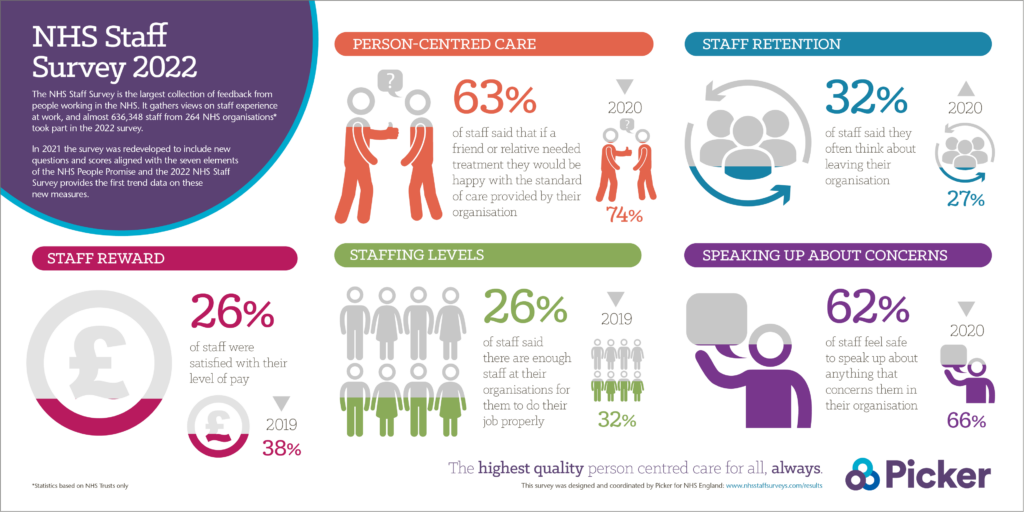Growing proportion of staff are unhappy with the standard of NHS care, according to survey of more than 600,000 NHS staff
Less than two thirds of staff in the NHS would be happy with the standard of care in their organisation if a friend or relative needed treatment, according to the national NHS staff survey 2022, published today. The proportion who would recommend their organisation as a place to work is also declining, and almost one in three staff “often think about leaving”.
Results from the survey, which was coordinated by the independent charity Picker on behalf of NHS England, include responses from more than 600,000 NHS staff working across more than 200 organisations. They provide rich insight into the experiences of staff from all occupational backgrounds in secondary and tertiary care: from consultants to care assistants, and from porters to paramedics. Questions in the survey cover all aspects of work experiences, particularly focussing on those described by the NHS People Promise.
One of the most concerning findings was a drop in the proportion of staff who agreed that “if a friend or relative needed treatment, I would be happy with the standard of care provided by [my] organisation”. Nationally, less than two thirds of staff (63%) agreed with this statement – a drop of 5% points since 2021, and of 11% points since 2020. More than one in eight staff members (13%) said that ‘disagree’ or ‘strongly disagree’ with the statement – including almost a fifth of all staff in ambulance trusts (19%).
Compared to the previous survey, conducted in 2021, staff reported fairly consistent and in some cases slightly improved experiences around many specific areas of their work. For example, 69% of staff feel valued by their teams (an increase of less than one percentage point since 2021) and 69% say they have opportunities to improve their knowledge and skills (up 2% points from 2021). But despite this, morale and engagement have declined since before the pandemic. Staff remain markedly less likely to say that they are enthusiastic about their jobs than in 2019 (67% vs 75%; an 8% point decline over three years), and the proportion who “often think about leaving” their jobs has risen to a new high of 32% (up from 28% in 2019; a 4% point increase). More than one in six (17%) say their will leave their organisation as soon as they can find another job.
The 2022 survey was conducted during September, October, and November 2022: a tumultuous period for the NHS that saw unions including the Royal College of Nursing balloting members on strike action over pay and staff shortages. The survey’s results align to this context: there was a sharp drop in the proportion of staff who said that they were ‘satisfied’ or ‘very satisfied’ with their level of pay, from 33% in 2021 to 26% in 2022. Some of the lowest overall levels of pay satisfaction were found amongst nursing and healthcare assistants (13%) and registered nurses and midwives (19%), but the year-on-year decline was steepest amongst medical and dental staff, whose level of pay satisfaction fell from 50% to 37%.

The survey also identified significant variation in the experiences of staff from different occupational groups and in different organisation types. As in previous years, staff working in ambulance trusts tended to report poorer experiences across a range of areas: for example only 42% of ambulance trust staff would recommend their organisation as a place to work, compared to a national average of 57%. In hospital trusts (excluding specialist providers), nurses and especially midwives reported poorer experiences on average: for example 58% of midwives said that they ‘often’ or ‘always’ “feel burnt out because of [their] work”, compared to an average of 35%.
Commenting on the findings, Chris Graham, Chief Executive at Picker, said:
“Today’s results give cause for alarm regarding the quality of care in the NHS. Although many will be unsurprised by the declines in staff pay satisfaction and morale given the wider context of industrial action, the steep drop in the proportion of staff who are happy with the standard of care their organisations offer is deeply concerning. Staff who work in the NHS every day have first-hand knowledge of standards, and their testimony should be taken very seriously.
“All good employers recognise the importance of staff feedback, and we know that NHS organisations will take a keen interest in their results. We are calling on NHS organisations to use today’s worrying results as a rallying call and as an opportunity to create dialogue with staff about how their experiences and the standards of patient care can be improved. Evidence shows that improvements in staff experiences are associated with better care, so employers should work with their people to understand how work arrangements can be developed to ensure that colleagues are valued, respected, and supported to provide person centred care.”
ENDS
Notes to editors
- For media enquiries, please contact Lorraine Pullen (lorraine.pullen@pickereurope.ac.uk; 07825 952160) or Greig Box-Turnbull (gbt@fortitudecommunications.com 07749 346073)
- The NHS Staff Survey is coordinated by Picker on behalf of NHS England. Fieldwork for the survey was conducted between September and November 2022.
- Taking part in the survey is compulsory for all NHS trusts and voluntary for other NHS organisations such as Integrated Care Boards and Social Enterprises; this year, 264 organisations participated, including all of England’s 215 NHS trusts.
- National results include data from 612,129 staff at 215 NHS trusts.
- All staff in full-time or part-time roles employed in participating organisations on 1st September 2022 were eligible for the survey. This includes staff on fixed-term contracts; on secondments; on sickness absence of up to 12 months; on parental leave; or suspended.
- Staff were not eligible for the survey if they were employed by sub-contracted or outside organisations or if they had been on long-term sick leave for more than a year. Staff providing only bank or locum services were able to participate in the survey, but their responses are not included in the national results.
- Full results for the survey are available from www.nhsstaffsurveys.com
- Picker’s team of researchers and data scientists are available to support organisations in understanding, measuring, and using workforce and user experience. For queries about our services or to request a call, please contact info@pickereurope.ac.uk.

